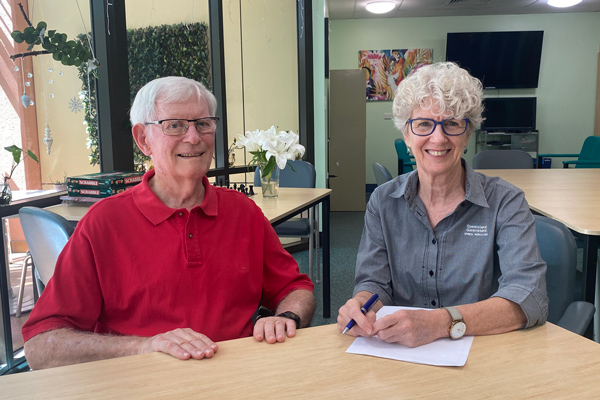- Foreword
- Message from Board Chair & Chief Executive
- 2023 Clinical Research Fellowships
- A message from the RBWH Foundation
- A message from The Common Good
- Metro North Research Excellence Awards
- Research stories
- ICU of the Future
- New approach ruling out pulmonary embolism
- Improving access to healthcare in the prison environment
- Safety and efficacy of peripheral versus centrally administered vasopressor infusion
- COVID-19 learnings set to inform future policy
- Telomere study could provide key to treating debilitating lung disease
- Productive Ward – Releasing time to care
- Brain organoids to revolutionise epilepsy treatment
- Reducing weight stigma in maternity care
- Parkinson’s Disease Check-In program giving people a voice
- Trial brings new treatment for common heart condition
- Teledentistry study shows promise in residential aged care
- Research fellow to boost Oral Health evidence-based care
- Study explores best approach to surgery for painful shoulder osteoarthritis
- The development and pilot testing of a stroke telerehabilitation decision toolkit
- Metro North Health delivers world-first breast scaffold surgery
- Regenerative jawbone hard at work care of collaborative Metro North Health approach
- Jamieson Trauma Institute leads e-scooter and e-bike injury research to drive community safety
- Forgotten fathers in pregnancy and obstetrics
- Putting the Spotlight on nursing and midwifery research
- Improving the health self-efficacy of stroke survivors
Parkinson’s Disease Check-In program giving people a voice

Patient Kevin Carmody undergoing his PD Check-In appointment with Speech Pathologist, Ann Finnimore
A trial of a novel self-management program for people with Parkinson’s Disease following intensive speech intervention is being delivered by a Speech Pathologist at The Prince Charles Hospital.
Parkinson’s Disease is a progressive neurogenerative condition that can lead to debilitating changes in speech and communication. Up to 90 per cent of people diagnosed with Parkinson’s will develop various changes including their speech volume, pitch variation and articulation, impacting on their ability to speak and interact. Accompanying the speech and communication changes are alterations to their physical capabilities including a tremor and slow, rigid movements leading to restricted mobility.
Speech Pathologist and trial lead Ann Finnimore said that the long-term management of functional changes experienced by people with Parkinson’s Disease can lead to considerable personal life challenges, with a person’s needs changing over time.
“Many people with Parkinson’s Disease become socially isolated as talking takes a lot effort, speech can be hard to hear and they start to talk less. This can significantly impact on someone’s personal situation including their employment, personal relationships and social connections,” Ann said.
Ann’s trial looks at developing a self-tailored and sustainable model following the completion of the Lee Silverman Voice Treatment (LSVT LOUD®), a widely accepted evidence-based treatment used for the maintenance of vocal intensity.
LSVT LOUD is a structured, intensive voice program which specifically targets speech volume. The treatment is delivered by speech pathologists, four days per week for four weeks. On completion of LSVT LOUD, the person receives a home exercise program for daily speech practice.
“Following the intensive treatment, we support individuals to maintain their louder voice by increasing their talking in daily life and continuing with a home exercise program,” Ann said.
“Many people find it challenging to monitor and manage their symptoms on their own, so having appropriate strategies to address their individual needs is essential.
“We assist people to develop a habit for speech practice on their own terms which they can sustain, which in turn helps them stay socially active.”
Patients attend a PD Check-In appointment where vocal measures are taken so they are able to monitor their speech volume after completing treatment. This is followed by a semi-structured discussion which helps the person to evaluate their success in talking with others and any changes in social activities which may impact on opportunities to talk.
This discussion helps the person to identify their supports and challenges for maintaining speech and for continuing with home practice. For example, if a person is unable to continue playing bowls, an alternative activity could be discussed to maintain connection with the community and to ensure talking with others is not reduced.
“Parkinson’s Disease is a debilitating condition that can be very challenging and arduous for people and their families to manage,” Ann said.
“Our goal is to create a program that is tailored to the person’s individual needs and can be sustained over time, to allow people to have a good quality of life and continue doing the things they enjoy for as long as they can.”
